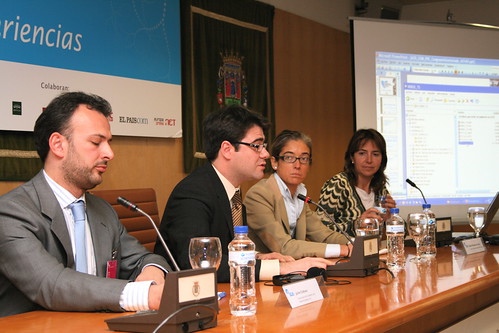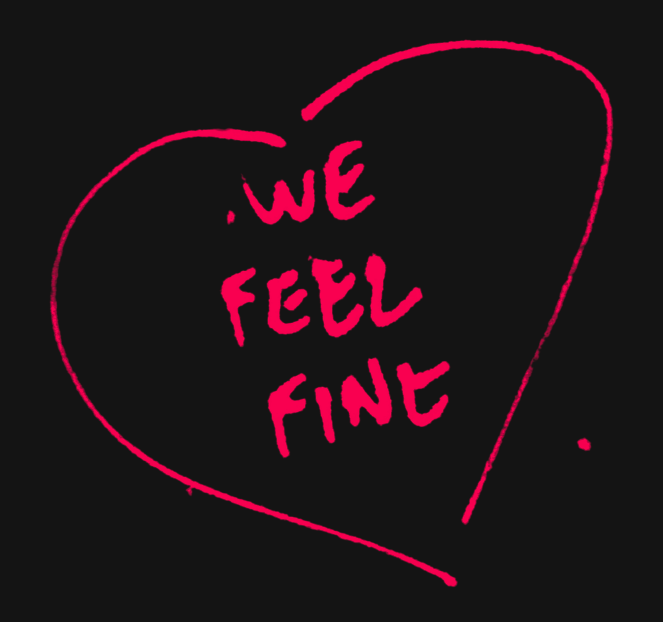As I move from the e-stas conference in Sevilla to the Skoll Forum at Oxford, gaps have been on my mind. Cultural gaps, and gaps created by differential speeds, and bridges across these gaps.
Usually I pride myself on being aware of gaps. I grew up all over the place, and feel that I know what it means to be foreign, to be out of the mainstream. In fact, I was just reminded that about 20 years ago, I was a sophomore at Harvard University, convinced that if I made my way back to Magdalen College here, I would feel just a little less desperately foreign. In the event, I turned the opportunity down because, I suppose, I started to cope again, and I began to feel a lot less foreign in the US.
But when I was at e-stas, I ran headfirst into a gap I didn't expect to be there--at the podium where I was to give a plenary speech. I had an hour, and a 20 minute presentation. But it became clear thate most of the Spanish people I talked to were very skeptical about the idea of opening the floor up to questions from the audience. They also clearly didn't expect me to seize the wireless mike so I could walk among the audience (the wireless mikes didn't go through to the simultaneous interpreters.) In the event, of course, there were questions from the audience. But it brought home to me how many people assumed that a broadcast format--or as Allen Gunn (aka Gunner) put it, a pulpit format--was the most efficient way to get information across. But they didn't expect me, an expert, to have questions about whether the information I chose to impart in this particular slide set, was relevant or interesting to them.
Which brings me back to the gaps that I am very much aware of, on a day-to-day basis. The obvious one is the hardware/software technology gap between GlobalGiving project leaders in the developing world and everyone else operating from the developed world. A more subtle one has to do with the cultural expectations that everyone brings to the table--we see expectations in the developed world for the web-savvy set being set by MySpace, SecondLife, Facebook--where you are expected to speak up, to approach people you may not yet know, to "put yourself out there" to see what might happen. For those who do not spend their lives online, more often than not this kind of behavior not only strikes them as inappropriate, it would not even cross their minds to consider this sort of behavior.
Either this will lead to a bigger digital divide and/or charges of cultural imperialism, or we need to find a way to meld cultures--at least online. Let's make sure that we don't exacerbate the technological gap with a cultural one.
A blog about my work, where international development meets tech, and my life, where food, books, design, dogs, and friends (and the occasional pig) make appearances.
Tuesday, March 27, 2007
Friday, March 23, 2007
Report out from e-stas: shameless piggybacking
Yesterday I noted I was at the e-stas conference in Seville, Spain. They are doing real-time webcasting of the conference, as well as chat (open to anybody, but the chats and the presentations have been predominantly in Spanish).
But for those of you who are looking for a succinct summary of the proceedings, you need look no further than Ismail Pena's blog ICTlogy. Here is his latest post about yesterday's proceedings.
But for those of you who are looking for a succinct summary of the proceedings, you need look no further than Ismail Pena's blog ICTlogy. Here is his latest post about yesterday's proceedings.
Thursday, March 22, 2007
From Sevilla with love

Here I am in Seville, at the e-stas conference which has been a powerful reminder of being in a foreign place.
Being foreign was for long a very normal feeling for me as I grew up Japanese in Italy, Germany, and the US, and as I worked intensively in client countries at the World Bank. For the last 6 years, I've pretty insulated from this feeling except for annual forays to the developing world that is stil part of my job at GlobalGiving.
And why has it been so long since I had this little frisson of foreignness? Well, almost every conference or meeting I have attended lately has either been based in the US or UK, and/or the organizers have had an American sensibility. It's a powerful reminder for me how in some ways I've been quite cocooned lately.
As I told Pilar Rodriguez, Secretary General for Telecommunications and Information, what excites me about being here is the "strength of weak ties"--I have weak ties to the vast majority of people here at the conference. On the one hand, being introverted, it terrifies me slightly to be here with people I don't know. On the other hand, as Mark Granovetter has posited, weak ties are where you can possibly find the most undiscovered value.
So what reminds me of being in a foreign place?
- Well, not speaking the language, and trying to follow along either through translators or scurrying after cognates.
- Wanting to have my presentation at the conference to be an interactive session--and being told quite firmly and kindly that the Spanish tradition is to listen to a lecture, not to question the prof. (This, however did turn out to be honored more in the breach, for which I am very grateful--including, in the interesting real-time chat enabled by the conference organizers.)
- How even quotidian things are different ... like lunchtime/break. Our lunch break today is between 14:15 and 16:00, and dinner will be again at 21:30 until ... who knows when.
Friday, March 16, 2007
Hands On Network: The power of integrating all the forces for change
I’m in New Orleans courtesy of the Hands On Network, to participate in their leadership conference to speak to their international affiliates about the opportunities that GlobalGiving can offer.
At first glance, this network is orthogonal to the work we do at GlobalGiving, which is all about giving. It is all about volunteering, for the most part doing that labor that is outside of the comfort zone of many of us who volunteer. At an abstract level it’s all about helping out locally—although it’s much less the case here in New Orleans since so many volunteers have come from all over the US to help. But the immediacy of the impact, pride, and the joy that both givers and receivers get in the process of direct service is palpable here at this conference And I’m in awe of that.
This was very much in evidence when we took a “rebuilding” tour of New Orleans yesterday. We stopped by the Lower 9th Ward, which was, to my great surprise, a big stretch of land bordering the Industrial canal that today is green as far as the eye can see. Trees and half-shattered houses dotted the landscape, but the predominant feature of the Lower 9th Ward was green weeds. And there was a small team of tyvek suited volunteers mowing the greenery in an attempt to preserve the tenuous property rights of the former residents (reportedly some local authority had proclaimed that lots that did not have evidence of occupation, including mowing weeds, were going to be considered abandoned). And to a person, my fellow passengers, all of whom are volunteers, some professionally--were moved by these young people and their sweaty brows.
We HAVE to find a way to integrate that emotional flame that real volunteering, real witnessing can spark into the work we do at GlobalGiving.
I'm increasingly convinced that we need to tap into the urge people have to be all that they can be. I used to think I would never understand Second Life, but increasingly I see it as an incredible outlet for people to be what they are limited from being in physical space. I see here at this conference that volunteering and service is another way for people to be the most they can be outside of their traditional roles as professionals, family members, as friends. If we can bring this all together online--by allowing people somehow to express their whole self, including their concern for communities and issues seemingly far away AND their acts of service locally AND their wildcap antics at school reflected in Facebook and in MySpace and Second Life, that's when we will have tapped into the fundamental shift that's taking place in philanthropy.
Coordination is the enemy of innovation in the early catalytic phases
At first glance, this network is orthogonal to the work we do at GlobalGiving, which is all about giving. It is all about volunteering, for the most part doing that labor that is outside of the comfort zone of many of us who volunteer. At an abstract level it’s all about helping out locally—although it’s much less the case here in New Orleans since so many volunteers have come from all over the US to help. But the immediacy of the impact, pride, and the joy that both givers and receivers get in the process of direct service is palpable here at this conference And I’m in awe of that.
This was very much in evidence when we took a “rebuilding” tour of New Orleans yesterday. We stopped by the Lower 9th Ward, which was, to my great surprise, a big stretch of land bordering the Industrial canal that today is green as far as the eye can see. Trees and half-shattered houses dotted the landscape, but the predominant feature of the Lower 9th Ward was green weeds. And there was a small team of tyvek suited volunteers mowing the greenery in an attempt to preserve the tenuous property rights of the former residents (reportedly some local authority had proclaimed that lots that did not have evidence of occupation, including mowing weeds, were going to be considered abandoned). And to a person, my fellow passengers, all of whom are volunteers, some professionally--were moved by these young people and their sweaty brows.
We HAVE to find a way to integrate that emotional flame that real volunteering, real witnessing can spark into the work we do at GlobalGiving.
I'm increasingly convinced that we need to tap into the urge people have to be all that they can be. I used to think I would never understand Second Life, but increasingly I see it as an incredible outlet for people to be what they are limited from being in physical space. I see here at this conference that volunteering and service is another way for people to be the most they can be outside of their traditional roles as professionals, family members, as friends. If we can bring this all together online--by allowing people somehow to express their whole self, including their concern for communities and issues seemingly far away AND their acts of service locally AND their wildcap antics at school reflected in Facebook and in MySpace and Second Life, that's when we will have tapped into the fundamental shift that's taking place in philanthropy.
Coordination is the enemy of innovation in the early catalytic phases
Friday, March 09, 2007
Amazing site

Taco van Ieperen, who is our very first GlobalGiving Ambassador, pointed me to We Feel Fine. There's an applet involved, but it loads quickly, and the only thing I can really compare it to is the way I felt when I first came across PostSecret.
Check out Taco's other posts on TED, which I've never attended, but everyone tells me is an amazing conference ...
Subscribe to:
Comments (Atom)